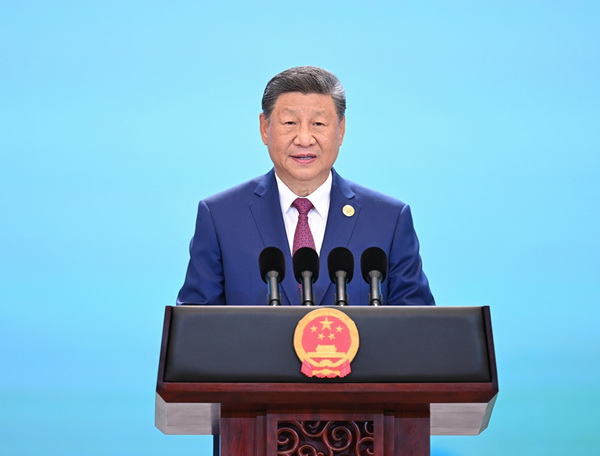How China’s Global Governance Initiative Challenges American Order as UN Marks 80 Years By Pushing Multipolar Future
At a time when the world marks the 80th anniversary of the founding of the United Nations in 1945, the debate over the future of global governance has reached a decisive moment.
What began as an institution designed to prevent another world war and promote collective security is now confronted by widening fractures in legitimacy, authority, and effectiveness.
Against this backdrop, China has unveiled its Global Governance Initiative (GGI), a concept paper that seeks to place reform of international institutions at the heart of the 21st century multipolar order.Image Source: China_Amb_India
From Post-War Order to Multipolar Realities
The United Nations was conceived in an era dominated by the victors of the Second World War. The Security Council’s permanent membership and veto structure reflected the geopolitical realities of 1945.
Eight decades later, with the rise of emerging economies and the collective weight of the Global South, the imbalance in representation has become one of the sharpest criticisms of the system.
African, Latin American, and Asian countries account for the majority of the world’s population, yet remain underrepresented in the highest decision-making bodies of the UN.
China’s Global Governance Initiative positions itself as a response to this legitimacy gap.
By calling for greater representation for developing countries, it echoes long-standing demands for Security Council reform and greater inclusivity in global economic institutions such as the International Monetary Fund and the World Bank, which have often been accused of reflecting Western priorities.
The Deficits of Today’s UN System
The Chinese concept paper identifies three deficits in the current international order: underrepresentation of the Global South, erosion of authority, and lack of effectiveness.
While the UN Charter enshrines sovereign equality, in practice, smaller states often find their voices muted in the face of great power competition. Similarly, the authority of the Security Council has been repeatedly undermined.
High-profile instances of unilateral military interventions and economic sanctions imposed outside the UN framework have eroded confidence in the system. Effectiveness has also become a growing concern.
Despite the UN’s adoption of the 2030 Agenda for Sustainable Development, progress on poverty reduction, climate change, and equitable growth has been far slower than expected.
The system has also struggled to adapt to new domains such as artificial intelligence, cyberspace, and outer space, where governance frameworks remain fragmented or absent altogether.
China’s Proposal for a Multipolar Governance Model
Beijing’s Global Governance Initiative advances five core commitments--sovereign equality, international rule of law, multilateralism, a people-centered approach, and real results.
In practice, this means expanding the decision-making capacity of developing countries, strengthening adherence to the UN Charter without double standards, and ensuring that governance is judged by its ability to address real global challenges.
The initiative makes an important distinction: reform does not imply dismantling the UN system. Instead, it seeks to make the existing institutions more responsive and representative.
This contrasts with Western critiques, which often focus on creating parallel arrangements outside the UN framework, such as coalition-based interventions.
China’s approach insists that legitimacy must flow through multilateral consensus, not unilateral force.
Filling the Gaps Left by Existing Mechanisms
Where the UN has struggled--such as climate commitments, AI regulation, or equitable trade--the GGI aims to establish coordinated frameworks that draw on the principle of “extensive consultation and joint contribution for shared benefit.”
By doing so, China hopes to address what it calls the “governance deficit” in areas that affect the daily lives of billions yet remain under-regulated.
The emphasis on sovereign equality also represents a rebuke of practices like secondary sanctions, which Beijing and other Global South states argue violate international law.
By elevating the voices of developing nations, China seeks to present the GGI as a corrective to decades of governance shaped by a small group of powers.
Comparisons with UN Reform Efforts
The UN itself has attempted internal reform. The Security Council has debated expansion for years without consensus.
Development financing has been restructured, and the UN has incorporated new institutions like the Human Rights Council to reflect evolving challenges. Yet these reforms have largely stalled in the face of political deadlock.
China’s GGI sets out to fill that vacuum by offering an overarching framework that ties together security, development, digital governance, and civilizational exchange under a single reformist agenda.
A Multipolar Vision at Odds with the Status Quo
As the UN turns 80, the future of global governance will be contested between competing visions. For the United States and its allies, the post-1945 framework remains valid, though in need of selective modernization.
For China and much of the Global South, the system has become unbalanced, dominated by a few states, and unable to deliver on urgent issues.
The Global Governance Initiative thus emerges not only as a Chinese policy proposal but also as a manifesto for multipolarity. Whether it succeeds in reshaping international norms will depend on the willingness of other states to adopt its principles.
But in one respect, it has already shifted the debate: the contest over the legitimacy of global governance is no longer theoretical--it is unfolding in real time, in an international system where power is diffusing and the Global South is demanding a greater voice.

